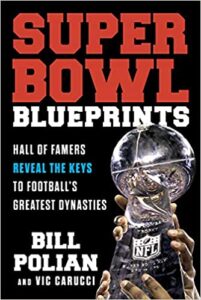A New Coach
In 1977, Tom Moore was named wide receivers coach for the Pittsburgh Steelers. This was a potentially intimidating assignment for a new coach with his first professional assignment.
After all, the Steelers wide receivers were talented, two-time Super Bowl champions and featured future Hall of Famers Lynn Swann and John Stallworth. Both were already stars with Swann being a previous Super Bowl Most Valuable Player.
An Honest Conversation
In his new book Super Bowl Blueprints: Hall Of Famers Reveal The Keys To Football’s Greatest Dynasties, Moore says Swann approached him and said, “Okay, I know you were a college coach and I’m going to help you if I can. Here’s the deal, Tom: A player can make a lot of money in pro football and I want to make a lot of money. I want to play as long as I can. So, John Stallworth and I know how to catch the football. Teach us what we don’t know.”
Moore then asked a great question. He asked, “Okay, what don’t you know?”
Swann responded, “We don’t have a clue how to adjust routes, how to read coverage, how to get open.”
At that summer’s training camp, Moore would spend the majority of his time coach his receiving corp on how to beat double coverages.
Throughout Moore’s five subsequent decades in pro coaching, he would always tell his assistants, “When you go into your first meetings in OTAs, the first thing you have to do is take all your players and find out from them what they don’t know, what they need work on, because they’re not going to tell you unless you ask them. And if you ask them, that’ll loosen them up and they’ll feel free to tell you.”
5 Leadership Lessons
Your Top Talent Wants To Be Coached
Lynn Swann approached Tom Moore, not the other way around. Great players, great salespeople, great teachers, great pastors, great doctors and lawyers, etc…, they all want to get better. They want to be coached. Your most talented people become frustrated when they are not coached. The best of the best are committed to personal growth and will seek out opportunities to improve.
Wisdom Comes From Great Questions, Not Great Answers
Did not you notice Coach Moore did not say, “Lynn, I’ve been watching film and let me tell you what I’m seeing.” No, he started by asking, “What don’t you know?” He did not assume he knew Swann’s deficiencies. Moore wanted to hear how the Swann self-evaluated himself. Smart leaders never rush into situations with answers, but rather questions.
Asking great questions also uncovers a person’s motivations. For Swann and Stallworth, it was to have a longer career and make more money.
Your Top Talent Almost Always Self-Corrects
You don’t have to alert top talent to their deficiencies, they already know them and usually have a plan to self-correct. Swann’s plan involved seeking out coaching. You only have to spend time pointing out deficiencies to your non-performers.
The Efficient Use Of Time
People are your most valuable resource. Time is second because when it’s gone, you can’t get it back. Once the improvement plan was identified, Coach Moore spent the majority of training camp working on that area. He did not focus his or his team’s efforts on non-essentials. Practice is designed to help you get better. Therefore, they spent their time on the areas of improvement Swann had identified.
Serving Builds Bridges
Moore said asking “What don’t you know?” will “loosen them up.” Once again, one of the things which makes someone a top talent is their response to coaching and desire to get better. Many high-achievers are initially standoffish but engaging someone as a servant to help them get better (and in this case, to have a longer career and increase their earning potential) builds trust and creates a relational bridge.
***BONUS*** The Multiplicative Power Of Mentorship
Because Lynn Swann approached Tom Moore in the summer of 1977 with a performance improvement plan, Moore has since taught this approach to the hundreds of assistant coaches he has come in contact with over the last five decades. The number of players and the amount of improvement which has taken place because he trained them to ask, “What don’t you know?” cannot be measured.
When you have your first meeting with your team or you want to do training, don’t lead with suggestions or assumption. Start the conversation with a great question. Ask “What don’t you know?” Their answer will help make you a better leader.
The Top 60 Leadership Quotes From 2021 Part 1 is my latest ebook. For many entering a post-pandemic environment, leadership looks completely different than the pre-pandemic world. People are more broken now. They are more uncertain. Fear and anxiousness are unwelcome constant companions. Cultures are more unhealthy. Relationships are more dysfunctional. Hope seems to be in short supply. Every day seems to bring a new hacking, natural disaster, or unexpected calamity.
Therefore, the fundamentals of leadership are more important than ever. The quotes in this book deal with the basics of leadership. If you want to be the best leader you can possibly be, click HERE or on the image provided to download this FREE resource. The lessons learned from last year, if applied, will sustain you for years to come.


